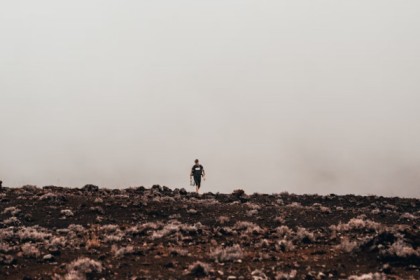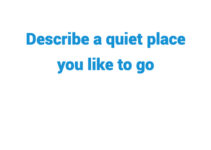Table of Contents
Describe An Occasion When You Lost Your Way

Cue Card
You should say:
- Where you were
- What happened
- How you felt
- And explain how you found your way
Sample Answer 1
I’ve always liked outdoor activities. I was in HK for 6 months last year, during which time I often went hiking with my friends, like once every two weeks. Despite that, me and my friends were still amateurs and we didn’t have full equipment.
For example, we didn’t have bottles that were big enough to carry enough water, or first aid treatment for outdoors, or even a compass if our phones accidentally died or received no signal. The time we got lost was on Lion Mountain.
We wanted to do the challenge of a 6-hour hike. We thought we’d be fine as long as we walk along the trail labelled on the map. So, we set off with a small bottle of water each.
We didn’t expect there to be lots of sidewalks, which really confused us. In fact, we didn’t think that much and didnt realise how dangerous it would be.
We just kind of went with the flow until we saw a dead end. However, that wasn’t what scared us. What really scared us was that there were a bunch of monkeys trying to attack us. It was a horrifying experience. We ran back and fortunately met two hiking professionals who were friendly and helpful.
Luckily, they were doing the same trail, so me and my friends just followed them and we finished the trail successfully.
Afterwards, the two professionals criticised us for not being responsible for ourselves and that we should have prepared more and thought more thoroughly.
Sample Answer 2
Before I start, I have to say this is quite a tricky topic, cause usually I like to think I’ve got a pretty good sense of direction.
But of course if I need to go on about an experience of me being lost, I do have one story to tell.
It was sometime in the summer. On this boiling day, I went hiking with my dog in Zipeng Mountain. Dunno if you’ve been there; it’s about an hour drive from where we are now.
Originally I had planned to spend about two hours there, but what happened was we kind of went on the wrong track. Just like that, me and the dog got stuck in the woods.
I have to admit it was terrible. What was torturing was I didn’t have any water on me. You know, I was expecting some cold drinks stands or vending machines along the way but there was absolutely nothing.
As well as this, another thing that was scary was where was no signal on my phone. Otherwise I could have tried the navigation on the map.
Still though, it was not the end of the world. Luckily we managed to find our way back before it got dark.
When it comes to my dog Jimmy, he was proper exhausted just as well. As you could have imagined, he was sticking his tongue out the whole time.
Anyway, next time I will make sure I pack at least two liters of water.
Part 3
1. Is a paper map still necessary?
I believe so.
While mobile maps offer greater detail and convenience, their functionality depends on having a charged device with reliable data connectivity.
In remote destinations or emergency scenarios, electricity and signals aren’t always guaranteed.
Carrying paper maps could bring several benefits. For one. they do not require cell service or battery power to function, so it’s a more reliable way to navigate.
What’s more, paper maps provide a larger surface area that can be spread out, marked up and used together by a group as you explore and plan an itinerary together.
In conclusion, paper map is a nice back up that provides more security for explorers, therefore still necessary.
2. Why do some people get lost more easily than others?
Some people get lost more easily for several reasons.
To start with, people who get lost easily usually lack preparation before they venture into new environments.
An experienced explorer would note landmarks, signage or route options in case they need to retrace their steps.
In contrast, new beginners wander aimlessly and therefore easy to find themselves lost.
Another possible reason is that sine people have difficulty engaging spatial reasoning ability.
I mean, they struggle to read maps or road signs and even couldn’t tell the basic directions in real life.
Anyway, it can be overwhelming for many to be in a strange place and people could learn to get better at navigating overtime.
3. How can people find their way when they are lost?
There are several things that people can do to find their ways.
The easiest or most direct way is usually asking for help from locals. When people are lost in a strange city, they could look for assistance in local shops, public buildings and so on.
A friendly local with familiar knowledge of the surroundings is a life-saver for people who are lost.
There’s also the obvious option of using navigation apps or devices. They’re easily accessible nowadays, but not always reliable.
So people need to double check that the maps are up to date and tracking function works well.
last but not least, remain calm and observant. It’s helpful to look for landmarks, street signs to identify your location.
Try to retracing your steps mentally while looking for something familiar.
4. Do you think it is important to do some preparation before you travel to new places?
Absolutely, preparing before traveling to unfamiliar destinations is always a good idea.
I understand that traveling is about taking adventures and exploring freely of unfamiliar places. However, doing researches could bring benefits for both enjoyment and security.
It’s useful to search information on routes, general costs of food and transportation, weather and so on.
Knowing the routes or the ideal way of transport can avoid getting lost especially in foreign countries when you don’t know the local language or couldn’t understand the road signs.
If people don’t do researches about the climate or weather in their destinations, it’s likely that they could wear clothes unfit for the weather.
Knowing the taboos of the local culture is also important to avoid unpleasant confrontations while traveling.
Overall, being prepared helps people to have a safe and pleasant journey.
Some IELTS Speaking part 2 cue-cards you may like :
- Describe Someone You Know Who Has Recently Moved To A New Place
- (2024) Describe A Famous Person You Are Interested In
- (2024) Describe An Invention That Is Useful In Your Daily Life
- (2024) Describe a Sports Program You Enjoy Watching
- (2024) Describe a Car Journey That You Remember Well
- (2024) Describe An Occasion When You Got Incorrect Information
Credits
Image : Photo by Alexis Antoine on Unsplash


